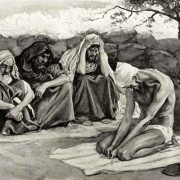You See Your Calling, Brethren
Anyone called into ministry has a story to tell of that calling. The Lord makes it personal, and confirms it with His Word. Such was the case with me.
I had a dream five days after I was filled with the Holy Spirit. I was 20 years old at the time. The dream is as vivid to me today as the night it came. In the dream there was a clear call to “go.” In the dream was a clear vision of God’s throne. In the dream was a clear response on my part. I said to the Lord, “Here I am. Send me.”
The amazing thing is that I didn’t know the Bible at all then. I’d not yet read Isaiah 6. Only as I grew in the Word did I discover that the Lord, in His Word, was interpreting the dream for me.
There are five important principles that I have taken from this dream (for the last 39 years). I have gone back to them again and again. They have been a lifeline for me … keeping me in God’s service. All of them are taken from that great chapter in Isaiah, chapter 6 — a chapter familiar to all of us.
1. Isaiah 6:1-4 In the year that King Uzziah died, I saw the Lord sitting on a throne, high and lifted up, and the train of His robe filled the temple. {2} Above it stood seraphim; each one had six wings: with two he covered his face, with two he covered his feet, and with two he flew. {3} And one cried to another and said: “Holy, holy, holy is the LORD of hosts; the whole earth is full of His glory!” {4} And the posts of the door were shaken by the voice of him who cried out, and the house was filled with smoke.
One, my personal focus must be to see the Lord. Calling comes from vision. It’s not about vision concerning what to do in ministry, but rather vision of the One who calls one into ministry.
I need to see Him, as Isaiah saw Him. I need to spend time with Him, personally and regularly. I want to see God, and know Him. I am allowed into the Holiest by the blood of Jesus, through the new and living way.
It’s no surprise to me that this part of my walk with the Lord is the most attacked and resisted.
2. Isaiah 6:5-7 So I said: “Woe is me, for I am undone! Because I am a man of unclean lips, and I dwell in the midst of a people of unclean lips; for my eyes have seen the King, the LORD of hosts.” {6} Then one of the seraphim flew to me, having in his hand a live coal which he had taken with the tongs from the altar. {7} And he touched my mouth with it, and said: “Behold, this has touched your lips; your iniquity is taken away, and your sin purged.”
Two, the heart of ministry flows out of the cross. From the cross I find forgiveness of my sins. So I say, “Woe is me, I am undone.” This means confession … ongoing confession, daily confession, consistent confession. Rather than being a morose spiritual discipline filled with dread and drudgery, confession is one of the most liberating experiences available for the Christian. Confession of sin is walking in the light — it’s the experience of grace conquering my inner darkness. It’s the blood of Jesus applied. It’s the creation of a humble and willing heart.
Romans 3:21-31 have been huge for me. These verses helped me have a much better understanding of the meaning of Christ’s death for me.
3. Isaiah 6:8 Also I heard the voice of the Lord, saying: “Whom shall I send, and who will go for Us?” Then I said, “Here am I! Send me.”
Three, I must remember that He has called me. He is the one that said, “Whom shall I send, and who will go for Us?” I didn’t call myself; my calling was an invitation from the Lord.
Like Paul, I say “I thank Jesus our Lord who has enabled me, because He counted me faithful, putting me into the ministry.” Had He not deemed or considered me faithful, I’d not be in the ministry. It’s all of grace.
Yet I must solidly accept this call, and act on the basis of it. Each situation into which He places me is an opportunity to behave like a called man. By faith I walk and obey. I do not see any reason for His calling, in and of myself.
1 Corinthians 1:1a Paul, called to be an apostle of Jesus Christ through the will of God…
1 Corinthians 1:26-29 For you see your calling, brethren, that not many wise according to the flesh, not many mighty, not many noble, are called. {27} But God has chosen the foolish things of the world to put to shame the wise, and God has chosen the weak things of the world to put to shame the things which are mighty; {28} and the base things of the world and the things which are despised God has chosen, and the things which are not, to bring to nothing the things that are, {29} that no flesh should glory in His presence.
4. Isaiah 6:9-10 And He said, “Go, and tell this people: ‘Keep on hearing, but do not understand; keep on seeing, but do not perceive.’ {10} Make the heart of this people dull, and their ears heavy, and shut their eyes; lest they see with their eyes, and hear with their ears, and understand with their heart, and return and be healed.”
Four, the message I preach and teach is to be preached and taught in spite of the response to it. Isaiah preached to closed hearts, to people with blind eyes. My task is to be faithful to the text of scripture, to proclaim it accurately and well. If there is a great response, wonderful. If there is no or little response, I am to preach and teach it anyway. I have a stewardship (1 Corinthians 9:17), and a steward must first of all be faithful (1 Corinthians 4:2).
In my 35 years of pastoral ministry, I have been called in a number of difficult places with sometimes obstinate people. Yet the Lord has not called me to produce results, but only to tell them what He’s told me.
Matthew 10:27 “Whatever I tell you in the dark, speak in the light; and what you hear in the ear, preach on the housetops.”
1 Corinthians 11:23a For I received from the Lord that which I also delivered to you…
5. Isaiah 6:11-12 Then I said, “Lord, how long?” And He answered: “Until the cities are laid waste and without inhabitant, the houses are without a man, the land is utterly desolate, {12} The LORD has removed men far away, and the forsaken places are many in the midst of the land.”
Five, when I am asked by the Lord to do this ministry in situations where there are no discernable results, perhaps no significant positive responses … I am to do it for as long as He wants me to. For Isaiah, his prophetic ministry would continue until all was lost. He’d asked the Lord how long he’d be doing that type of ministry to those kinds of people. The Lord’s response did not deter him. He continued on, faithfully. Most certainly, we are glad for that now. Had he not continued, we would not have the 66 chapters of his great prophecy.
Early in the ministry in Monterey, I was really struggling with the relative snail’s pace type of growth we were seeing. I was bummed that it wasn’t like Harvest Christian Fellowship in Riverside, or Calvary Chapel Costa Mesa. It wasn’t Southern California, period.
But then it dawned on me from 1 Corinthians 12 that the Lord decides who gets which gifts, He decides the ministries in which those gifts are to operate, and He decides the impact (literally, energizings) they are to have. He is sovereign in all of it. In other words, I was called to be obedient and faithful. If God didn’t make me a Greg Laurie or Chuck Smith, what was that to me? I was to follow Him (John 21:22). I can’t tell you how liberating that was for me to hear from the Spirit!
So there are the principles I’ve been operating by. Hope they help.










